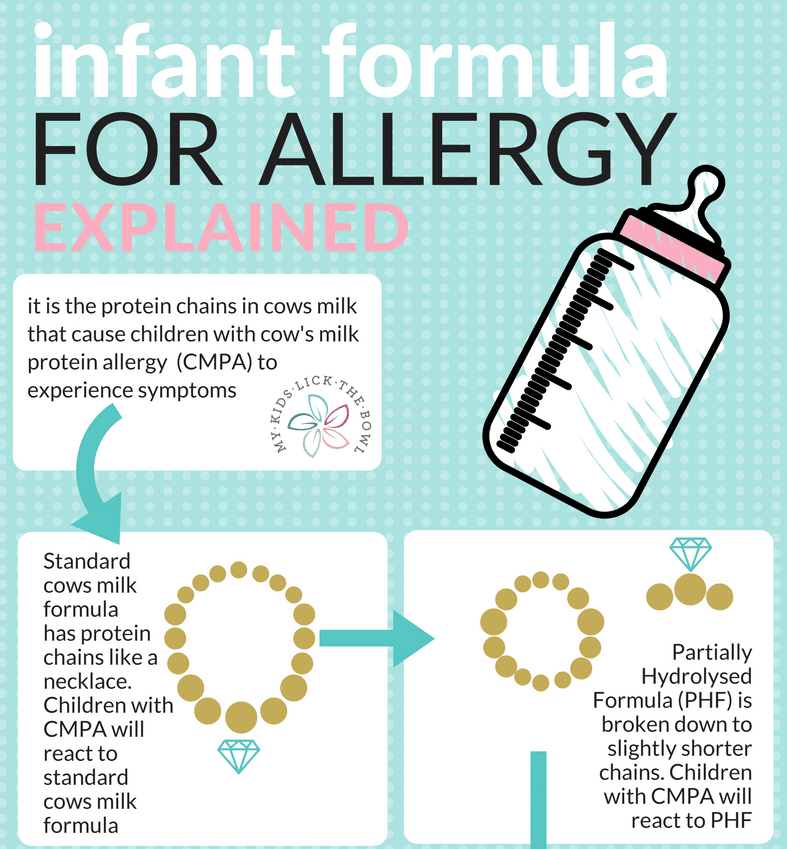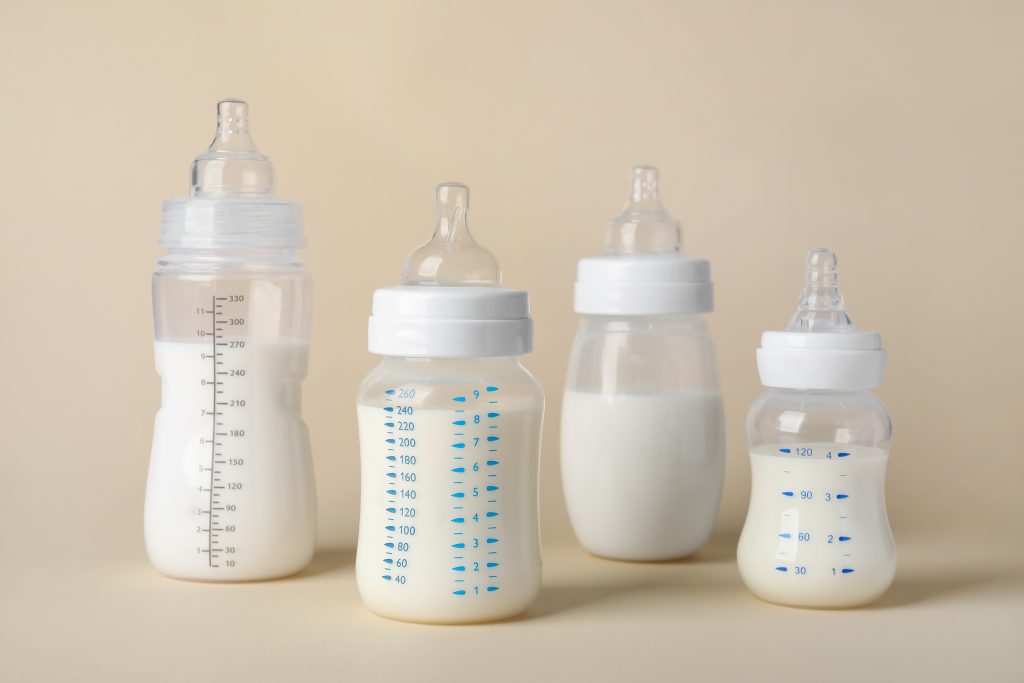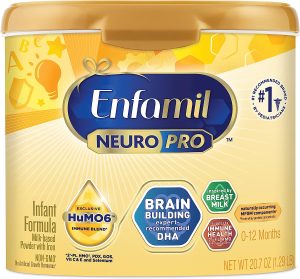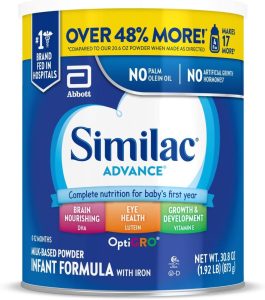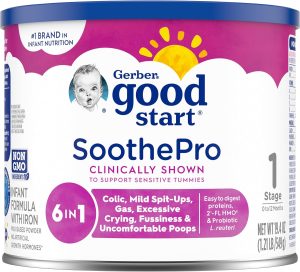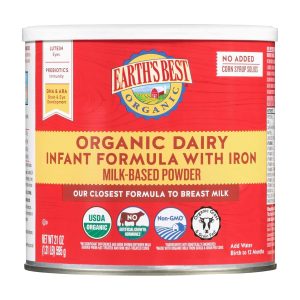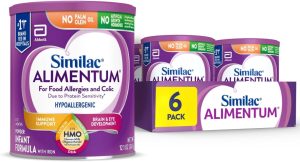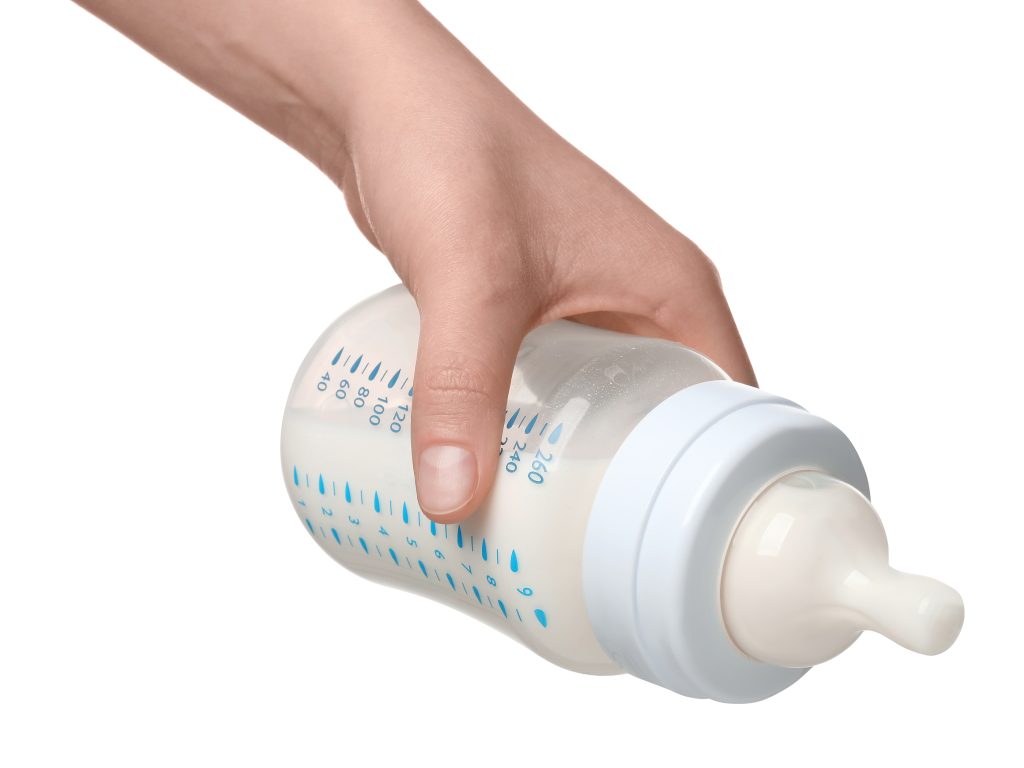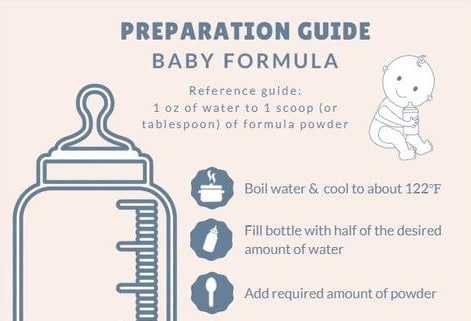Baby formula is an essential nutrition source for infants who cannot breastfeed or whose mothers choose not to breastfeed. It is specially formulated to give babies all the vital nutrients they need for healthy growth and development, including proteins, carbohydrates, fats, vitamins, and minerals.
Baby formula is also designed to be easily digested by babies and is available in different types and forms to meet the specific needs of additional infants. Formula feeding can be a convenient and practical option for parents who cannot breastfeed or need to supplement breast milk with formula. It allows both parents to participate in feeding their baby and provides a reliable source of infant nutrition. It’s important to note that while breastfeeding is often recommended as the best option for babies, baby formula can still provide a healthy and nutritious alternative.
This guide provides parents with information and guidance on choosing and using baby formula safely and effectively. The focus will typically include information on the different types of baby formula available, such as cow’s milk-based, soy-based, and hypoallergenic formulas, and their specific benefits and drawbacks.
It will also guide how to prepare and store baby formula, including instructions on how to mix the procedure, how to sterilize bottles and nipples, and how to keep the recipe safe. The guide may also include information on recognizing signs of formula intolerance or allergy and what to do if your baby experiences these symptoms. Overall, the focus for baby formula is designed to help parents make informed decisions about their baby’s nutrition and ensure they use baby formula safely and effectively.
Our Top Pick Formulas for Babies
Best Baby Formula Brand Overall – Enfamil NeuroPro Infant Formula
Best For Exclusive Formula Feeding – Similac Advance Infant Formula
Best Baby Formula for Constipation – Gerber Good Start SoothePro Infant Formula
Best Organic Baby Formula – Earth’s Best Organic Infant Formula
Best Baby Formula for Gassy Babies – Similac Alimentum Infant Formula
The Importance of Baby formula
Baby formula is essential for several reasons:
- It provides essential nutrients: Baby formula is designed to give infants all the vital nutrients they need for healthy growth and development. It contains a balanced mix of proteins, carbohydrates, fats, vitamins, and minerals necessary for a baby’s overall health and well-being.
- It’s a safe and reliable source of nutrition: Baby formula is a safe and reliable food source for infants who cannot breastfeed or whose mothers choose not to breastfeed. It’s also a convenient and practical option for parents who must supplement breast milk with formula.
- It allows both parents to participate in feeding: Formula feeding allows both parents to participate in feeding their baby, promoting bonding and strengthening the parent-child relationship.
- It’s beneficial for premature babies: Premature babies often require special nutrition to support their growth and development, and baby formula can provide the necessary nutrients.
- It’s a good option for babies with certain medical conditions: Some babies may have medical conditions that make breastfeeding difficult or impossible. Baby formula can provide a safe and effective alternative source of nutrition for these babies.
Overall, baby formula is an essential option for parents who want to ensure their babies receive the nutrition necessary for healthy growth and development. While breastfeeding is often recommended as the best option for babies, baby formula can still provide a healthy and nutritious alternative.
Different Types of Baby formula
There are different types of baby formula available in the market, including:
- Cow’s milk-based formula: This is the most common type of baby formula made from cow’s milk, modified to be more easily digestible for infants.
- Soy-based formula: This formula is made from soy protein and is a good option for babies allergic to cow’s milk or lactose intolerance.
- Hydrolyzed formula: This formula is made from proteins broken down into smaller pieces, making it easier for babies to digest. It’s a good option for babies with cow’s milk protein allergy or other digestive issues.
- Lactose-free formula: This formula is made for babies who are lactose intolerant and cannot digest lactose, a sugar found in milk.
- Organic formula: This formula is made from organic ingredients and contains no synthetic additives.
- Specialty formula: Specialty formulas are available for babies with specific medical conditions, such as premature babies or babies with reflux.
Key Features to Look for in Baby Formulas
When choosing a baby formula, there are several key features to look for:
- Nutritional content: The formula should contain a balanced mix of proteins, carbohydrates, fats, vitamins, and minerals appropriate for your baby’s age and dietary needs.
- Safety and quality: Look for a formula that has been tested and approved by relevant regulatory bodies, such as the FDA, and is free from harmful additives or contaminants.
- Digestibility: The formula should be easy for your baby to digest and not cause digestive issues such as constipation or diarrhea.
- Allergen-free: If your baby has allergies or sensitivities, look for a formula free from common allergens such as soy, dairy, or gluten.
- Convenience: Choose a formula that is easy to prepare and store and available in a size and packaging that suits your needs.
- Brand reputation: Look for a reputable brand with a good safety record and positive reviews from other parents.
- Price: While cost should not be the only factor in your decision, choosing a formula that fits your budget is essential.
Remember, every baby is different; what works for one baby may not work for another. It’s essential to consult with your pediatrician before choosing a baby formula to ensure you make the best decision for your baby’s needs.
Top Baby Baby Formulas
It’s difficult to determine a definitive list of the top baby formulas, as every baby’s needs differ, and what works for one baby may not work for another. However, here are some popular baby formulas that pediatricians and parents highly recommend:
1. Enfamil NeuroPro Infant Formula – Best Baby Formula Brand Overall
FEATURES:
- MFGM and DHA
- Non-GMO
- Prebiotics
- Suitable for babies from birth to 12 months
- Available in different forms
- HuM06 Immune Support
- Enfamil helps in Brain-building
- Triple prebiotic Blend
- Inspired by Breast Milk
PROS :
- Supports brain development
- Easy to digest
- Supports digestive health
- Suitable for babies from birth to 12 months
- Available in different forms
- Expert Recommended DHA
CONS:
- Pricier than other options
- May cause constipation
- May not work for all babies
Famous formula that is designed to support a baby’s brain development. It contains MFGM (milk fat globule membrane) and DHA, essential brain development nutrients. The formula is also designed to be easy to digest and has prebiotics to support digestive health.
Enfamil NeuroPro Infant Formula is suitable for babies from birth to 12 months and is available in powder and ready-to-feed forms. User reviews praise its effectiveness in supporting baby’s growth and development, but some note that it is a bit pricier than other options. Overall, Enfamil NeuroPro Infant Formula is a good option for parents looking for a formula that supports their baby’s brain development.
Enfamil NeuroPro Infant Formula offers several benefits for babies, which include:
- Supports brain development: The formula contains MFGM (milk fat globule membrane) and DHA, essential nutrients for brain development.
- Easy to digest: Enfamil NeuroPro Infant Formula is designed to be easy to digest, which can help reduce the risk of fussiness and gas in babies.
- Supports digestive health: The formula has prebiotics to support digestive health and can help strengthen the immune system.
- Suitable for babies from birth to 12 months: The formula is ideal for babies from birth to 12 months, providing parents with a convenient feeding option throughout their first year.
- Available in different forms: The formula is generally in powder and ready-to-feed forms, giving parents flexibility when feeding their baby.
Overall, Enfamil NeuroPro Infant Formula is a good option for parents looking for a formula that supports their baby’s brain development and digestive health.
2. Similac Advance Infant Formula – Best For Exclusive Formula Feeding
FEATURES:
- Easy to Digest
- Supports Brain & Eye Development
- No Palm Olein Oil
- Feeding Resources
- No Artificial Growth Hormones†
- Complete Nutrition for Infant
PROS :
- It doesn’t have added sugars.
- It has 2’-FL HMO prebiotics.
- It has more inositol (24 mg) than the Advance formula (4.7 mg).
- There have been no recalls for this formula.
- Baby friendly taste.
- A trusted brand, recommended by hospitals.
- From Birth – 12 months complete nutrition for your baby’s first year.
- Has DHA, Lutein, and Vitamin E.
CONS:
- It’s not lactose-free.
- It’s not dairy-free.
- It contains vegetable oils.
- Hard to find in stores as it sells out quickly.
- Gives gas sometimes.
- Pricey
Similac Advance Infant Formula is famous for supporting a baby’s brain and eye development. It contains OptiGRO, a blend of DHA, lutein, and vitamin E, essential nutrients for a baby’s growth and development. The formula also has prebiotics to support digestive health and is easy to digest. Similac Advance Infant Formula is suitable for babies from birth to 12 months and is available in powder and ready-to-feed forms. User reviews praise its effectiveness in supporting baby’s growth and development, but some note that it can be a bit pricier than other options. Overall, Similac Advance Infant Formula is a good option for parents looking for a formula that supports their baby’s overall development.
Similac Advance Infant Formula offers several benefits for babies, which include:
- Supports brain and eye development: The formula contains OptiGRO, a blend of DHA, lutein, and vitamin E, essential nutrients for a baby’s brain and eye development.
- Supports immune system: The formula is designed to support a baby’s immune system with prebiotics that help to strengthen the digestive system.
- Easy to digest: Similac Advance Infant Formula is easy to digest, which can help reduce the risk of fussiness and gas in babies.
- Suitable for babies from birth to 12 months: The formula is ideal for babies from birth to 12 months, providing parents with a convenient feeding option throughout their first year.
- Available in different forms: The formula is generally in powder and ready-to-feed forms, giving parents flexibility when feeding their baby.
3. Gerber Good Start SoothePro Infant Formula – Best Baby Formula for Constipation
FEATURES:
- Soothing Nutrition
- Probiotic Formula
- Give Your Baby a Good Start
- Wholesome Options
- Nutrition For Growing
- Comfort Proteins
- Non-GMO
- Available in different forms
- Reduces colic and reflux
PROS :
- Gentle on the stomach
- Suitable for babies from birth to 12 months
- Available in different forms
- Reduces colic and reflux
CONS:
- Pricier than other options
- May not work for all babies
- May cause constipation
Gerber Good Start SoothePro Infant Formula is a famous formula designed to be gentle on a baby’s stomach. It contains Comfort Proteins, which are easy to digest and help reduce the risk of fussiness and gas in babies. The formula also has probiotics to support digestive health and is designed to be easy to digest.
Gerber Good Start SoothePro Infant Formula is suitable for babies from birth to 12 months and is available in powder and ready-to-feed forms. User reviews praise its effectiveness in reducing colic and reflux in babies, but some note that it can be a bit pricier than other options. Overall, Gerber Good Start SoothePro Infant Formula is a good option for parents looking for a gentle formula on their baby’s stomach.
Gerber Good Start SoothePro Infant Formula offers several benefits for babies, which include:
- Gentle on the stomach: The formula is designed to be gentle on a baby’s tummy and contains Comfort Proteins, which are easy to digest and can help reduce the risk of fussiness and gas in babies.
- Supports digestive health: The formula has probiotics to support digestive health and can help strengthen the immune system.
- Suitable for babies from birth to 12 months: The formula is ideal for babies from birth to 12 months, providing parents with a convenient feeding option throughout their first year.
- Available in different forms: The formula is generally in powder and ready-to-feed states, giving parents flexibility when feeding their baby.
- Reduces colic and reflux: User reviews praise the formula’s effectiveness in reducing colic and reflux in babies.
4. Earth’s Best Organic Infant Formula – Best Organic Baby Formula
FEATURES:
- Made with organic ingredients
- Provides complete nutrition
- Easy to digest
- Non-GMO
- Suitable for babies from birth to 12 months
- Available in different forms
- Free from artificial preservatives, flavors, and colors
- Milk based
- Soy based
- Partially Hydrolyzed Protein for babies with fussiness and gas
- Gentle formula with easy to digest proteins, including partially hydrolyzed whey
PROS :
- Mimics breast milk without adding corn syrup
- plusAdded ARA fatty acids and iron
- Made with organic ingredients
- Provides complete nutrition
- Easy to digest
- Suitable for babies from birth to 12 months
- Available in different forms
CONS:
- Soy formula is not organic
- Can be foamy
- Pricier than other options
- It may not work for all babies
Earth’s Best Organic Infant Formula is a famous formula made with organic ingredients and designed to provide complete nutrition for babies. It contains a blend of carbohydrates, proteins, and fats similar to breast milk and is fortified with iron, DHA, and ARA to support a baby’s growth and development. The formula is certified organic and contains no artificial preservatives, flavors, or colors.
Earth’s Best Organic Infant Formula is suitable for babies from birth to 12 months and is available in powder and ready-to-feed forms. User reviews praise its effectiveness in supporting baby’s growth and development, but some note that it can be a bit pricier than other options. Overall, Earth’s Best Organic Infant Formula is a good option for parents looking for a formula made with organic ingredients that provide complete nutrition for their baby.
Earth’s Best Organic Infant Formula offers several benefits for babies, which include:
- Made with organic ingredients: The formula is made with organic ingredients, which can give parents peace of mind, knowing that their baby is consuming a procedure free from harmful chemicals and pesticides.
- Provides complete nutrition: The formula contains a blend of carbohydrates, proteins, and fats similar to breast milk and is fortified with iron, DHA, and ARA to support a baby’s growth and development.
- Easy to digest: Earth’s Best Organic Infant Formula is designed to be easy to digest, which can help reduce the risk of fussiness and gas in babies.
- Suitable for babies from birth to 12 months: The formula is ideal for babies from birth to 12 months, providing parents with a convenient feeding option throughout their first year.
- Available in different forms: The formula is generally in powder and ready-to-feed forms, giving parents flexibility when feeding their baby.
5. Similac Alimentum Infant Formula – Best Baby Formula for Gassy Babies
FEATURES:
- Hypoallergenic formula
- Fortified with nutrients
- Easy to digest
- Suitable for babies with milk allergies or sensitivities
- Available in different forms
- Reduced lactose content
- Has 2′-FL HMO
PROS :
- Hypoallergenic formula
- Supports growth and development
- Suitable for babies with milk allergies or sensitivities
- Easy to digest
- Available in different forms
CONS:
- Pricier than other options
- Unpleasant taste
- May cause constipation
Similac Alimentum Infant Formula is a hypoallergenic formula designed for babies struggling to digest milk-based recipes. It is made with hydrolyzed casein protein, which is easier to digest than regular milk protein, and is free from lactose, which can cause digestive issues for some babies. The formula is fortified with iron, DHA, and ARA to support a baby’s growth and development.
Similac Alimentum Infant Formula is suitable for babies from birth to 12 months and is available in powder and ready-to-feed forms. User reviews praise its effectiveness in reducing colic and other digestive issues in babies with milk allergies or sensitivities. However, some note that it can be pricier than other options. Overall, Similac Alimentum Infant Formula is a good option for parents looking for a hypoallergenic formula for their baby who is having trouble digesting milk-based procedures.
Similac Alimentum Infant Formula offers several benefits for babies, which include:
- Hypoallergenic formula: The formula is designed for babies who have difficulty digesting milk-based procedures and is made with hydrolyzed casein protein, which is easier to digest than regular milk protein and is free from lactose.
- Supports growth and development: The formula is fortified with iron, DHA, and ARA to support a baby’s growth and development.
- Suitable for babies with milk allergies or sensitivities: Similac Alimentum Infant Formula is a good option for babies with milk allergies or sensitivities who cannot tolerate other milk-based formulas.
- Easy to digest: The formula is designed to be easy to digest, which can help reduce the risk of fussiness and gas in babies.
- Available in different forms: The formula is generally in powder and ready-to-feed states, giving parents flexibility when feeding their baby.
- Reduces colic and other digestive issues: User reviews praise the formula’s effectiveness in reducing colic and other digestive problems in babies with milk allergies or sensitivities.
Overall, Similac Alimentum Infant Formula is a good option for parents looking for a hypoallergenic formula for their baby who is having trouble digesting milk-based procedures. The formula is designed to be easy to digest, supports growth and development, and is suitable for babies with milk allergies or sensitivities.
Baby Formula Comparison Table
| Product | Enfamil NeuroPro Infant Formula | Similac Advance Infant Formula | Gerber Good Start SoothePro Infant Formula | Earth’s Best Organic Infant Formula | Similac Alimentum Infant Formula |
|---|---|---|---|---|---|
| PROS | |||||
| Supports brain development | It doesn’t have added sugars. | Gentle on the stomach | Mimics breast milk without adding corn syrup | Hypoallergenic formula | |
| Easy to digest | It has 2’-FL HMO prebiotics. | Suitable for babies from birth to 12 months | plusAdded ARA fatty acids and iron | Supports growth and development | |
| Supports digestive health | It has more inositol (24 mg) than the Advance formula (4.7 mg). | Available in different forms | Made with organic ingredients | Suitable for babies with milk allergies or sensitivities | |
| Suitable for babies from birth to 12 months | There have been no recalls for this formula. | Reduces colic and reflux | Provides complete nutrition | Easy to digest | |
| Available in different forms | Baby friendly taste. | Easy to digest | Available in different forms | ||
| Expert Recommended DHA | A trusted brand, recommended by hospitals. | Suitable for babies from birth to 12 months | |||
| From Birth – 12 months complete nutrition for your baby’s first year. | Available in different forms | ||||
| Has DHA, Lutein, and Vitamin E. | |||||
| CONS | |||||
| Pricier than other options | It’s not lactose-free. | Pricier than other options | Soy formula is not organic | Pricier than other options | |
| May cause constipation | It’s not dairy-free. | May not work for all babies | Can be foamy | Unpleasant taste | |
| May not work for all babies | It contains vegetable oils. | May cause constipation | Pricier than other options | May cause constipation | |
| Hard to find in stores as it sells out quickly. | It may not work for all babies | ||||
| Gives gas sometimes. | |||||
| Pricey |
Step-by-Step Guide to Preparing a Formula Feed
Sure, here is a step-by-step guide to preparing a formula feed:
- Wash your hands thoroughly with soap and water before handling any feeding equipment.
- Clean and sterilize all feeding equipment, including bottles, nipples, and measuring utensils, according to the manufacturer’s instructions.
- Boil water and let it cool to the recommended temperature for your baby’s formula. The recommended temperature can be found on the formula packaging or by consulting your pediatrician.
- Measure the correct amount of water into the bottle using a measuring utensil. Use the correct water ratio to formula, which can also be found on the formula packaging or by consulting your pediatrician.
- Add the correct amount of formula to the bottle using a measuring utensil. It is essential to use the right formula to ensure your baby gets the appropriate nutrients.
- Close the bottle and shake it gently to mix the formula and water.
- Check the temperature of the formula by testing a few drops on your wrist. The procedure should be warm but not too hot.
- Feed your baby the prepared formula immediately. If you need to store the recipe for later use, refrigerate it immediately and use it within 24 hours.
- After feeding, discard any leftover formula and clean all feeding equipment thoroughly.
It is essential to follow these steps carefully to ensure your baby’s formula is prepared safely and correctly. Consult your pediatrician if you have any questions or concerns about formula feeding.
Conclusion
In summary, when choosing a baby formula, it is crucial to make an informed decision based on your baby’s specific needs and preferences. Every baby is different, and what works for one may not work for another. It is essential to consult with a pediatrician before making any changes to your baby’s diet and to consider factors such as features, user reviews, prices, and performance when selecting a formula. Making an informed decision will ensure your baby receives the necessary nutrients to support their growth and development.
Consider the recommended baby formulas that were mentioned earlier in this conversation. These formulas have been selected based on their features, user reviews, prices, and performance. Choosing the right recipe for your baby is crucial as it provides them with the necessary nutrients to support their growth and development. However, it is essential to remember that every baby is different, and what works for one baby may not work for another. Therefore, it is recommended to consult with a pediatrician before making any changes to your baby’s diet and to choose a formula that works best for your baby’s specific needs and preferences.
Baby Formula Preparation Guide
If you’re wondering how to prepare infant formula, you’ll find our easy-to-follow Lebenswert formula instructions below so you can be sure your little one is getting exactly what they need.
Baby Formula: Guide for the confused/worried parent
A factual look into the allergy baby formula types used for the management of cows milk protein allergy. The science explained in simple terms
